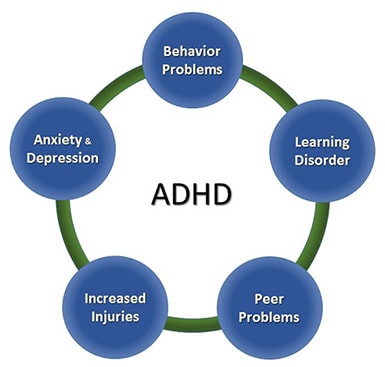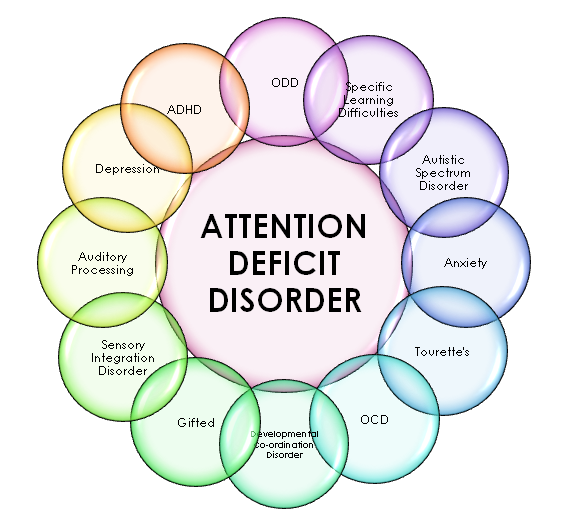
Attention deficit hyperactivity disorder (ADHD) is a neurodevelopmental disorder that affects attention, impulse control, and hyperactivity. It is one of the most common mental disorders affecting children and adolescents, and it can also persist into adulthood.
Symptoms of ADHD
The symptoms of ADHD can vary from person to person, but they generally fall into three categories: inattention, hyperactivity, and impulsivity.
Inattention
People with ADHD may have difficulty paying attention to tasks or details, especially when the work is repetitive or boring. They may also have difficulty following instructions, staying organized, and completing tasks.
Hyperactivity
People with ADHD may be excessively restless or fidgety. They may have difficulty sitting still, especially in quiet or structured situations. They may also talk excessively or have difficulty waiting their turn.
Impulsivity
People with ADHD may act without thinking about the consequences of their actions. They may interrupt others, blurt out answers in class, or have difficulty waiting their turn. They may also have difficulty controlling their emotions and may experience frequent outbursts.
Diagnosis of ADHD
ADHD is diagnosed by a mental health professional, such as a psychiatrist or psychologist. The diagnosis is based on a comprehensive evaluation that includes a review of the person's symptoms, medical history, and development.
Treatment of ADHD
The treatment for ADHD typically includes a combination of medication and therapy. Medication can help to improve attention and impulse control, while therapy can help people with ADHD to develop coping skills and strategies for managing their symptoms.
What Causes ADHD?
The exact cause of ADHD is unknown, but it is thought to be caused by a combination of genetic and environmental factors. Research suggests that ADHD is associated with differences in the brain's structure and function.
Living with ADHD
ADHD can be a challenging condition to live with, but it is important to remember that it is a manageable disorder. With the right treatment and support, people with ADHD can live successful and fulfilling lives.
Here are some tips for living with ADHD:
- Find a treatment plan that works for you. There is no one-size-fits-all treatment for ADHD. Some people may benefit from medication, while others may prefer therapy or a combination of both.
- Develop coping skills. There are a number of coping skills that can help people with ADHD to manage their symptoms. These skills may include things like time management, organization, and stress management.
- Build a support system. Having a strong support system is important for people with ADHD. This may include family, friends, teachers, or therapists.
If you think you or your child may have ADHD, it is important to talk to a mental health professional. They can help you to understand the condition and develop a treatment plan that is right for you.
Subtitles
What are the different types of ADHD?
There are three main types of ADHD:
- Predominantly inattentive type: People with this type of ADHD have difficulty paying attention and staying organized.
- Predominantly hyperactive-impulsive type: People with this type of ADHD have difficulty sitting still and controlling their impulses.
- Combined type: People with this type of ADHD have symptoms of both inattention and hyperactivity-impulsivity.
How is ADHD diagnosed?
ADHD is diagnosed by a mental health professional, such as a psychiatrist or psychologist. The diagnosis is based on a comprehensive evaluation that includes a review of the person's symptoms, medical history, and development.
What are the treatment options for ADHD?
The treatment for ADHD typically includes a combination of medication and therapy. Medication can help to improve attention and impulse control, while therapy can help people with ADHD to develop coping skills and strategies for managing their symptoms.
Is there a cure for ADHD?
There is no cure for ADHD, but it is a manageable disorder. With the right treatment and support, people with ADHD can live successful and fulfilling lives.
What are the long-term effects of ADHD?
If left untreated, ADHD can lead to a number of problems, including academic difficulties, social problems, and substance abuse. However, with the right treatment and support, people with ADHD can overcome these challenges and live successful lives.
How can I help someone with ADHD?
If you know someone with ADHD, there are a number of things you can do to help them. Be patient and understanding, and offer your support and encouragement. You can also help them to develop coping skills and strategies for managing their symptoms.
Here are some additional things you can do to help someone with ADHD:
- Help them to stay organized. This may involve helping them to set up a system for managing their tasks and deadlines.
- **Help them to avoid distractions
Webyou tend to do things on the spur of the moment, without thinking, which gets you into trouble. Some people with ADHD have problems with inattentiveness, but not with. WebAttention deficit hyperactivity disorder (ADHD) is a behavioural disorder, not an illness or a sign of low intelligence. Read more on Better Health Channel website. Attention deficit. WebAttention-deficit/hyperactivity disorder (ADHD) is a chronic condition that affects millions of children and often continues into adulthood. ADHD includes a. WebMany ADHD symptoms can be typical childhood behaviors, so it can be hard to know what's ADHD-related and what's not. Learn more about how to recognize ADHD.
What is ADHD #adhd

Source: Youtube.com
ADHD Symptoms (from the DSM-5) #adhd #shorts

Source: Youtube.com
What Is Adhd And What Does It Stand For, What is ADHD #adhd, 703.13 kB, 00:30, 99,587, Sandstone Care, 2022-04-28T19:16:57.000000Z, 2, Other Concerns and Conditions with ADHD | CDC, 367 x 385, jpg, , 3, what-is-adhd-and-what-does-it-stand-for
What Is Adhd And What Does It Stand For. WebAttention-deficit/hyperactivity disorder (ADHD) is one of the most common mental disorders affecting children. Symptoms of ADHD include inattention (not being able to keep focus),.
What Is Adhd And What Does It Stand For, WebAttention-deficit/hyperactivity disorder (ADHD) is a chronic condition that affects millions of children and often continues into adulthood. ADHD includes a. WebMany ADHD symptoms can be typical childhood behaviors, so it can be hard to know what's ADHD-related and what's not. Learn more about how to recognize ADHD.

Other Concerns and Conditions with ADHD | CDC - Source: cdc.gov

ADHD - Source: thrivedowntown.com

Attention Deficit Disorder - Lanc UK - Source: lanc.org.uk
es-conditions › adhdAttention-deficit/hyperactivity disorder (ADHD) in children
.
attention-deficitADHD: Symptoms, Types, Testing, and Treatment - WebMD
ADHD is the most commonly diagnosed mental disorder in children. Find out the symptoms in children and adults, types, causes, diagnosis, treatment, and outlook. What does add adhd stand for.
What does add adhd stand for
What does add adhd stand for What do the initials adhd stand for.
What do the initials adhd stand for
What do the initials adhd stand for What is adhd and what does it stand for.
What is adhd and what does it stand for
What is adhd and what does it stand for What do the initials adhd stand for.
bout Attention-Deficit / Hyperactivity Disorder (ADHD)
Research does not support the popularly held views that ADHD is caused by eating too much sugar or watching too much television. Of course, many things, including stressful life events, might make symptoms worse, especially in certain people. But the evidence is not strong enough to conclude that they are the main causes of ADHD. .
› adhdADHD (Attention Deficit Hyperactivity Disorder): What Is It?
Outlook. Attention deficit hyperactivity disorder (ADHD) is a mental health condition that can cause unusual levels of hyperactivity and impulsive behaviors. People with ADHD may have trouble , .
ttention_deficitAttention deficit hyperactivity disorder - Wikipedia
0.8–1.5% (2019, using DSM-IV-TR and ICD-10) [2] Attention deficit hyperactivity disorder ( ADHD) is a neurodevelopmental disorder characterised by executive dysfunction occasioning symptoms of inattention, hyperactivity, impulsivity and emotional dysregulation that are excessive and pervasive, impairing in multiple contexts, and otherwise age , .
.
.
.
.
topicsAttention-Deficit/Hyperactivity Disorder - National Institute ...
Adults with undiagnosed ADHD may have a history of poor academic performance, problems at work, or difficult or failed relationships. ADHD symptoms can change over time as a person ages. In young children with ADHD, hyperactivity-impulsivity is the most predominant symptom. .
ts-families › adhdPsychiatry.org - What is ADHD?
ADHD is often first identified in school-aged children when it leads to disruption in the classroom or problems with schoolwork. It is more commonly diagnosed among boys than girls given differences in how the symptoms present. However, this does not mean that boys are more likely to have ADHD. .
.
0 Comments